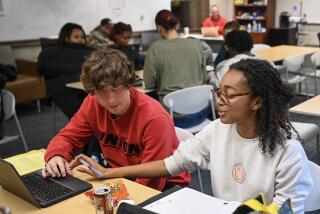Education’s cheating epidemic
- Share via
Cheating was, is and probably always will be a fact of life. Recently, technology has provided new ways to cheat, but advanced electronics can’t be blamed for our increasing willingness to tolerate it.
Once upon a time, being an honorable person included the notion that your word was your bond, and integrity was a crucial element in establishing a good reputation. At least, that was part of the narrative that made up our social compact. My teaching experience tells me, however, that lying and cheating are seen by a lot of kids today as a crucial part of any path to success. The only shame is in getting caught.
Students tell me that math is the easiest course in which to cheat because they can program calculators before a test and cheat undetected. An English teacher told me she no longer counts her vocabulary quizzes in her students’ grades because she hasn’t found a way to stop them from copying the answers. And our school’s not-uncommon policy is basically to forgive a first offense and to enter it into the permanent record only if the student is caught again.
Compounding the problem is the fact that many students aren’t fully aware of what constitutes cheating. While teaching at a university a few years ago, I was surprised when a student I had accused of plagiarizing by cutting and pasting text from a website denied having cheated. He indignantly argued that he would never cut and paste — he had retyped the entire thing.
A few weeks ago, a student took my final exam in the morning and gave the answers to someone who was taking it that afternoon. The second student didn’t notice that the question on his test was slightly different, and the answer was now wrong. When confronted, he professed not to understand that he had cheated. He thought that getting a test answer from another student in advance was no different than studying with a partner. A few days later, when his mother came in to find out why her son had failed, she too said she couldn’t understand the difference.
In a survey of students last month, I asked what they thought of the idea of requiring next semester’s students to sign a pledge that said, simply, “I will not lie, cheat or steal.” Most thought it was a great idea, but they didn’t think the pledge would change anything.
As for the proposed penalties, they thought that giving an F on an assignment was OK, giving an F on the report card was acceptable but harsh and that putting the names of the cheaters on a public “wall of shame” would be going too far.
That implies that students put a value on their public reputation, so a wall of shame might be an effective threat. But the idea didn’t fly any better with my colleagues than it did with my students. One compared it to cutting off the hands of a thief as a deterrent to crime. Another went so far as to say that it would be the same as taking the offending students outside and having the class throw things at them. Instead of focusing on the penalty for cheating, she said, we should be addressing the pressures that make students feel they need to cheat to succeed.
She has a point. It’s easy to see how students these days end up feeling that cheating is an accepted part of success. They hear every day about people borrowing money they had no way of paying back, and banks falsifying forms to enable the borrowing, and Wall Street brokers knowingly selling worthless housing securities based on those loans. And no one was punished for that, except for those who happened to be holding the bag when someone noticed it was empty.
Today’s vice president of the United States was caught having plagiarized his stump speech in the 1980s. At the time, many thought that would be the end of his political career, but in today’s world, it’s just one of those things.
Students, parents, teachers and administrators complain that there is too much cheating going on in our schools, but they tend to point at each other when asked who should be responsible for fixing the problem. That’s not how change will happen — but something has to change.
Cheating needs to be addressed as part of a cultural problem. It is up to us to make it unacceptable not only in schools but also throughout society. Every time we accept it as unavoidable or tolerable, we help ensure that the culture of cheating is passed on to the next generation.
Victor Dorff, a former attorney and journalist, teaches math at Palisades Charter High School.
More to Read
A cure for the common opinion
Get thought-provoking perspectives with our weekly newsletter.
You may occasionally receive promotional content from the Los Angeles Times.









